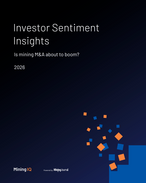This article is 6 years old. Images might not display.
"In terms of international resource companies, coming from the Australian Securities Exchange and the Toronto Stock Exchange, I think this is a trend that we will see continue," London Stock Exchange head of international business development primary markets, Tom Attenborough, told Mining Journal.
"On both the ASX and the TSX, companies have told us that they feel the liquidity has been low and the depth of institutional investors has decreased, so some of those businesses are opting for a London listing to gain access to a bigger pool of potential global investors."
It's no secret that juniors have been struggling to raise capital in recent years, particularly in North America. Highfield Resources CEO Peter Albert recently told Mining Journal he'd head talk of a "mass extinction" event. Some companies, though, are looking elsewhere for capital. Vancouver-based Pure Gold Mining was one company that recently listed in London.
In June, Africa-focused gold producer Resolute Mining listed on the LSE after 30 years on Australia's ASX. Other recent starters include Danakali, a potash company focused on Eritrea, which joined the London market in July 2018, and Tharisa, a European-headquartered company with mining operations in South Africa.
In total, 12 mining companies made their debut in London last year.
Attenborough said mining was a key LSE sector, representing more than half a trillion dollars of market capitalisation. There were 165 mining companies making up some 23% of the global market capitalisation of mining companies, including three of the biggest, Rio Tinto, Anglo American and BHP.
Attenborough said 100 mining companies had a market value under $100 million. "It's not just big-cap names, smaller firms make up a significant proportion too," he said.
Other market observers confirm the movement of international companies seeking capital to London.
International law firm Gowling WLG partner and head of natural resources Charles Bond said his company had been approached by a number of mining companies in international jurisdictions over the past six months, "in particular from Canada where the ability to raise new capital has been particularly difficult given the focus in the region on other business sectors".
It is widely understood that investor appetite for cannabis-related firms in Canada has not been favourable for mineral explorers after it was legalised in the country in October 2018. Interest in cryptocurrencies has also made it hard for juniors to raise capital in Canada. The attraction of London and European investors is clear.
"The London market has a deep pool of institutional capital, meaning that even in difficult times, for the right project and management team, there should still be capital available," said Bond.
"Market sentiment is, however, still difficult for generalist investors in the mining sector, but as supply for certain minerals, like copper, starts to be more of a concern, we would hope that investors will start to refocus."
While the UK has received some degree of negative press coverage in recent years over the government's handling of Brexit, the LSE suggested this had little bearing on the exchange's international listings business.
"London is very international. At a time of geopolitical uncertainty, London is seen as a very welcoming market," said Attenborough. "We continue to see interest in London from the Middle East, Africa and China. Last year, over half of the market for the first time was owned by non-UK investors, and two of the largest IPOs so far this year have been from the Middle East.
"The press narrative of doom and gloom [post 2016] is not supported by the numbers.
"2017 and 2018 - post referendum - were two of our strongest years for listings and IPOs here in London. London is up 35% on H1 last year in IPO proceeds raised while Europe ex-UK is down by 55%, and globally there's been a 24% decrease. There is a strong pipeline here in London."
Gowling WLG consultant Andrew Wright said while a London listing might help companies access capital, juniors should still expect to work hard to prove themselves, regardless of whether listing in Toronto, Sydney, Johannesburg or London.
"London is certainly open for business, but ultimately it is looking for quality - production and near production companies are the main requisites," he said. "It's still very difficult at the moment for exploration companies to raise funds, however it's still possible if the company has a resource showing high grades or large tonnage at lower grades.
"The deep pool of available capital in London means that international mining companies are increasingly tapping into the UK's investor capital to support new projects and expansion. Companies will ultimately follow the money when listing."


























